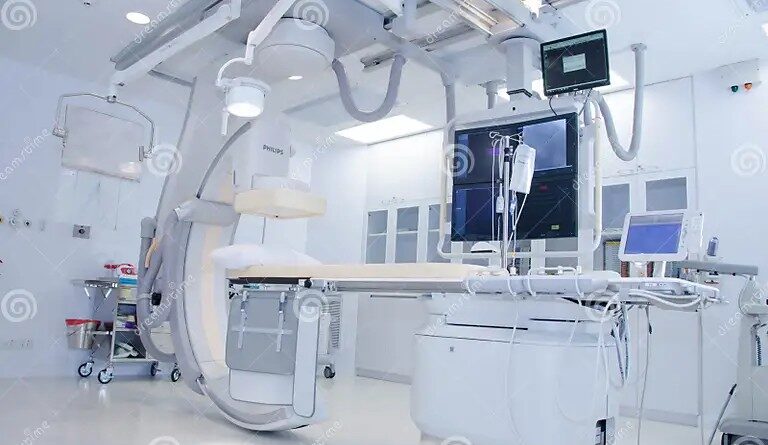Nigeria’s lone Cardiac Catheterisation Laboratory, By Salisu Na’inna Dambatta
A report in the Nigerian Journal of Cardiology in 2021 indicates that, heart or cardio vascular diseases involving the heart and blood vessels, particularly obesity-induced hypertension, are rampaging among the youth in the country.
Cardiologists or medical doctors who specialised in the treatment of heart diseases in the country, including hypertension and heart attck, need certain vital specialised equipment to treat their patients timely and effectively. One of the facilities they urgently need is Catheretisation Laboratory (Cath Lab).
A Cardiac Consultant Surgeon at the Aminu Kano Teaching Hospital (AKTH), Professor Kamilu Musa Karaye indicates that, Cardiac Catheterisation laboratories are specialized advanced medical technology facilities used for diagnosing and treating heart conditions. These laboratories have equipment such as X-ray machines, ultrasound devices and several other diagnostic tools.
The tools in cardiac catheterisation laboratories can also be used in various non-invasive or minimally invasive procedures such as coronary angiography, angioplasty or widening narrowed or blocked blood vessels and stent implantation. Stent implantation is done to keep blood vessels open. Beside using the Cath Lab to detect and treat the over 30 distinct types of heart diseases, surgeons use them for other interventional procedures like valve repair or replacement.
Still on what a Cath Lab is, medical Internet sites described it thus, “A Cath Lab is a specialty laboratory equipment for imaging of coronary and blood vessels in the body. Apart from displaying on the monitor, images can be seen in 360° in details and total clarity. This enable doctors to see the images from many perspectives. The clarity leads to high precision in diagnosing. A catheterisation Laboratory also enabled surgeons to conduct minimally invasive tests and procedures in diagonising and treating cardiovascular diseases involving the heart and blood vessels.”
The critical role Cath Lab plays in the treatment of cardiovascular heart diseases and blood vessels complications makes it a vital tool for medical doctors, especially cardiac and thoracic surgeons, the super specialists who operate on the heart, lungs, esophagus, major blood vessels inside the chest and the bony structures and tissues that form and support the chest cavity.
In other words, a Cath Lab is a one-stop facility used in proceedures to detect, identify and finally treat heart diseases. But in the whole of Nigeria, there is only one catheretisation laboratory in a private hospital. It is obviously grossly inadequate for the country’s large population.
That single Cath Lab is probably inaccesible to most patients of cardio vascular and blood vessels diseases. They may not have the financial wherewithal to afford its services. They may be totaly unaware of its availability in the country.
Data from various sources indicate that Nigeria is one of the countries that suffer high death rates from various heart diseases. Professor Kamilu Musa Karaye, the professor of Cardiology who teaches and conducts research at the Bayero University Kano, and the Aminu Kano Teaching Hospital, revealed that Kano state has one of the highest rates of death from heart diseases. Such diseases are widely prevalent in Northen Nigeria. So obviously cardiac catheretisation laboratories are urgently needed to assist cardiologists in diagnosing and treating the large number of patients before it is too late.
The one-Cath Lab status of Nigeria, where the first open heart surgery was conducted in 1974, suggests that the current administration may consider providing one at the recently-refurbished State House Clinic in Abuja. It is astonishing that none of the 22 public University Teaching Hospitals, 20 Federal Medical Centres and 17 Specialist Hospitals in the country has a catheretisation laboratory. Although the Aminu Kano Teaching Hospital, which serves a huge population and one or two more of the federal Teaching Hospitals are working hard to have one each, as of now that is just an aspiration.
Suprisingly, the price for Cath Lab starts from $200,000 for the most basic with few tools to $3-$6 million for the most advanced version that has sophisticated tools. The Federal Government and some philanthropists can procure Cath Labs for some of the Teaching Hospitals and Federal Medical Centres in the country. Health-care businesses can also invest in Catheretisation Laboratories. Doing so will help cardiologists in doing their job faster and with greater accuracy, thereby saving precious lives. It will also contribute in minimising foreign medical tourism.
Salisu Na’inna Dambatta is an advocate for Health Journalism



